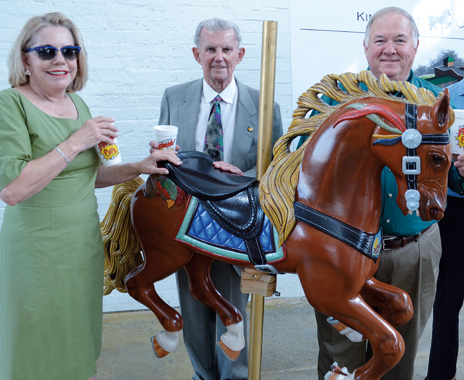Fred “Pal” Barger has done a lot for his hometown of Kingsport, Tennessee.
The founder of the quick-service chain Pal’s Sudden Service recently donated more than $1 million to help build an athletic field house and scoreboard for his alma mater Dobyns-Bennett High School; to erect an automotive training center at the Northeast State Community College; and to build a carousel in the middle of downtown Kingsport.
But Barger’s charitable efforts aren’t just directed to his hometown. He’s committed to all of the local communities in which Pal’s Sudden Service operates, a commitment that has helped earn the regional chain a cult following.
Pal’s Sudden Service first opened its doors in 1956 and has since grown to 26 locations spread across Tennessee and Virginia. In 2001, the restaurant was awarded the Malcolm Baldrige National Quality Award, the highest honor a business can receive from the U.S. Department of Commerce, for its business leadership and effective training programs.
“George Bush gave the award to us in 2001,” Barger says. “It’s nice to have that recognition, but we didn’t do it for all that for that. We did it because it’s the right thing to do.”
Soon after accepting the award, Barger created the Business Excellence Institute, a training program that consults others on management principles, leadership development, and other important business skills. The institute has since brought hundreds of people every year into the city.
All of the business success has afforded Pal’s Sudden Service the ability to give back to its communities in a big way. “We’ve been in business for 57 years, and we’ve been successful. The community has supported us,” Barger says. “I believe that it’s not what you gather, but what you scatter. If you have what you need, you should share it with others.”
George Adkins, president and CEO of the Tennessee Hospitality and Tourism Association (TnHTA), says restaurants like Pal’s tend to give more as they grow and become more successful.
“Restaurants are cyclical, so when they make more money, they want to give more, and they can give more,” Adkins says. “I think as the economy turns around, they will give more. I think that’s true with all nonprofits: Their budgets go up as the economy gets better.”
According to the National Restaurant Association Educational Foundation (NRAEF), the restaurant industry’s annual charitable donations are estimated to be more than $3 billion.
“What we’ve found is that despite the economy being up or down, restaurants continue to give back because they are ingrained in the daily life of their local communities and often see the effects of economic downturns firsthand,” says Ashley Mills, spokeswoman for the NRAEF. “It’s natural that if they are in a position to help, they do.”
When it comes to giving back, Barger says, he doesn’t have any specific goals. Instead, he makes the decision to donate on an opportunity-by-opportunity basis. Pal’s Sudden Service receives requests to give every day, but because the company can’t do it all, he picks and chooses based on needs. That is why when Barger’s high school alma mater approached him about donating for a new scoreboard, he did not hesitate to write a check. The money Barger donated was enough to finance a modern, state-of-the-art video scoreboard. At the first football game of the season, the entire stadium rose to give Barger a standing ovation for his contribution.
But restaurants do not have to give millions of dollars to make a difference, says Kingsport mayor Dennis Phillips. Brands can do something as simple as donating food, supplies, or labor to local events.
“There are ample events that local restaurants have the opportunity to participate in,” Phillips says. “However, restaurants probably get 400 requests a week to do things, and the public needs to understand that a restaurant can’t do everything financially. The requests exceed the ability to help. Instead, restaurants can pick the things that they do, and do them well.”
TnHTA’s Adkins says that when most restaurant operators do participate in a charitable event, they tend to choose something local because they “want to give back to the community [that] helped them become who they are.”
He suggests restaurants looking to participate in philanthropic efforts make sure they are passionate about the cause they take on. Operators should first research the cause they plan to support to make sure the charity is reputable so that the food, money, or in-kind donations go directly to the place it needs to be, he says.
According to the NRAEF, 98 percent of restaurants that make charitable contributions do so to a local organization. As a result, 80 percent of consumers believe that restaurants are good corporate citizens.
This better explains Pal’s Sudden Service’s cult-like following in the towns where the fast-food chain is located. Barger prefers to donate locally because he wants to support the community that has supported his business for the past 57 years.
Mayor Phillips says he will continue to be one of Pal’s avid customers.
“You can never thank Pal and an organization like Pal’s enough,” he says. “The benefits of a restaurant like Pal’s are basically never ending because Pal’s restaurants are active in all of the communities in which they serve. I hope that every day this city shows our appreciation to Pal and his organization for what they do for this and other cities.”











